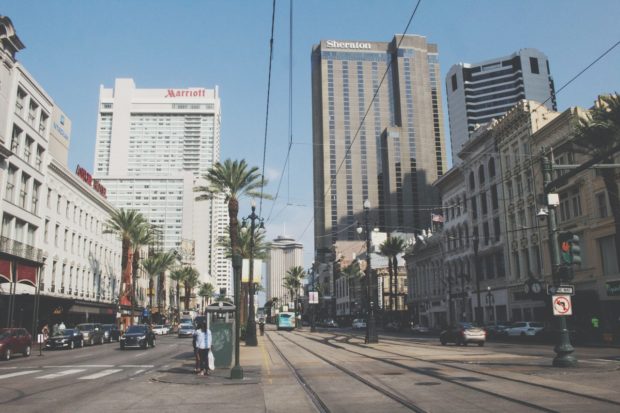You have no items in your cart. Want to get some nice things?
Go shopping
FAT TUESDAY
I’m six or seven, and we’re standing on Canal Street, my dad, mom and sister, who’s too young to remember any of this. It’s late February but so hot the air ripples like cellophane. The sky, a scratched sheet of slate, hangs over Masion Blanch; the crowds between us and storefront glass threaten to stampede at any moment. But you never give up a place on the front row, not for your life.
Rex has already passed, and now the usual make-shift krewes in ancient, beat-up trucks decorated with festoons, crepe paper and glitter. They stink of moldy hay and stale beer. The horse droppings in the street and motorcycle fumes don’t help, but it’s good to be here. Masses of screaming, happy people scurrying for worthless largesse. My sister and I have already caught more beads and doubloons than we need, but that’s the idea–amassing doodads and trinkets out of pure greed, because it’s Mardi Gras, because we can.
A battered pick-up lurches before us only to sputter, cough and stop. It looks like any other parade truck, but it’s idling, so we notice the theme: Acadian Paradise. A loudspeaker blasts bluegrass and the people on board cavort to the beat like mimes. The whole procession has come to a halt. We hate when this happens because after a while the krewe stops throwing and everybody gets bored. This one young guy is so drunk he hangs over a rickety wooden rail of the truck. His hair is slicked back with pomade and he’s smeared his face with white paint. In one hand he clutches a pint of Thunderbird, in the other, a golden Zulu cocoanut. He’s having a grand time, laughing, flirting with pretty girls in the crowd, puking onto the asphalt, handing out entire plastic bags of glass beads. strung in Czechoslovakia. We like him because he’s not stingy. He leans way over, nearly upside down, to give my sister one of those bags.
A band starts up in the distance, snare drums, trumpets, Sousa, and the parade starts to roll again. Acadian Paradise backfires, lunges, and the young guy topples over the rail, his head pinned under the rear tire. It happens instantaneously, and the crowd’s roar abruptly stops. The silence feels like pressure at the bottom of a sea. Nothing moves except the black, vulcanized, dusty, rimless, splotched tire which takes forever to crush his skull. We hear a rip, the way it sounds when you tear off the outer shell of a cocoanut. Someone cries out. The truck screeches to another halt. We see the mangled head, bloody now with yellowish fluid seeping out of what were once ears. How could we not? We’re on the front line, dad, mom and my sister. My white and brown shoes are maybe three feet from the damage. And they’re wet. The young man’s body quivers and then fuses for good with the street. The crowds remain eerily silent.
The driver kneels down and howls. I start to scream and jump up and down. Just jump, that’s what I do, and scream. Mom takes one hand, dad the other, and they push me and my sister through the turbulent sea of bodies.
We’re blocks away and I’m still hysterical. Dad finally cradles me in his arms and carries me to the Dodge wagon parked on Elysian Fields, a long walk from Canal Street. They throw my shoes out of the window as we race home – and Ruth’s bag of foreign beads too.
Sometimes I think our flight from that obese day has never really ended, that my scream lies buried in a Canal Street sewer like some one-of-a-kind carnival bauble. And I remember him, the generous, jovial young man, his face white as Florida, who tripped up death by throwing us a life.
Louis Gallo
Louis Gallo’s work has appeared or will shortly appear in Southern Literary Review, Fiction Fix, Glimmer Train, Hollins Critic, Rattle, Southern Quarterly, Litro, New Orleans Review, Xavier Review, Glass: A Journal of Poetry, Missouri Review, Mississippi Review, Texas Review, Baltimore Review, Pennsylvania Literary Journal, The Ledge, storySouth, Houston Literary Review, Tampa Review, Raving Dove, The Journal (Ohio), Greensboro Review, and many others. Chapbooks include The Truth Change, The Abomination of Fascination and Status Updates. He is the founding editor of the now defunct journals, The Barataria Review and Books: A New Orleans Review. He teaches at Radford University in Radford, Virginia.




